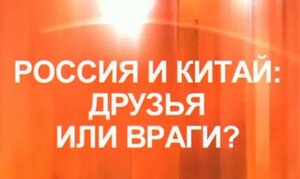
One of the main factors of influence on Moscow during its military aggression against Ukraine is the USA and EU's pressure on Russia. It keeps increasing and already has some negative consequences for the Russian Federation. This is, first and foremost, political and economic sanctions: international isolation, blocking access to Western credits and technologies, blocking the work of Russian companies and banks in the US and European markets, personal limitations for a wide circle of policy-makers in the Ukrainian direction.
Russia is attempting to find a new partner, which would help it to compensate for the losses from the actual break of relations with the United States and European Union. Russia sees as such partners first of all China and other countries of the so-called “Third World” (mainly of the Asia-Pacific region). Supposedly they can assist Russia in implementing its strategy of shifting from the West to the East, which has been actively talked about lately. At this, Moscow puts high hopes on China, as the second after the USA country in the world by economic potential, sticking to independent foreign and domestic policy.
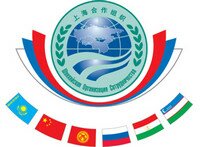 For example, in the political sphere, Russia traditionally expects that China will support Russia's position in the UN Security Council, on the Ukrainian question included. By the way, trying to counteract the West, Russia has initiated the establishment of the Shanghai Cooperation Organization (SCO), with the participation of China and other countries, which Moscow considers both, Russia's allies and potential enemies of the USA.
For example, in the political sphere, Russia traditionally expects that China will support Russia's position in the UN Security Council, on the Ukrainian question included. By the way, trying to counteract the West, Russia has initiated the establishment of the Shanghai Cooperation Organization (SCO), with the participation of China and other countries, which Moscow considers both, Russia's allies and potential enemies of the USA.
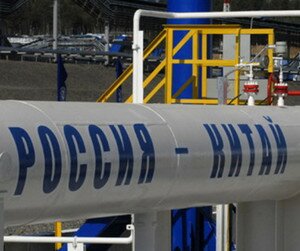 In particular, the Russian government is interested in cooperation with China in trade-economic and investment issues. The stress is put on energy projects, including increased supplies of Russian oil and gas to China. The main such projects are the construction of gas pipelines “The Power of Siberia” (Eastern Siberia — PRC) and “Altai” (West Siberia — PRC). Russia presents them as a means of “diversification of its export opportunities,” as well as “a tool to influence on the EU” (in terms of a possible reorientation of gas flows from Europe to China).
In particular, the Russian government is interested in cooperation with China in trade-economic and investment issues. The stress is put on energy projects, including increased supplies of Russian oil and gas to China. The main such projects are the construction of gas pipelines “The Power of Siberia” (Eastern Siberia — PRC) and “Altai” (West Siberia — PRC). Russia presents them as a means of “diversification of its export opportunities,” as well as “a tool to influence on the EU” (in terms of a possible reorientation of gas flows from Europe to China).
Russians are especially trying to deepen their cooperation with China on issues of global and regional security. Therefore, they have initiated consultations with China, as well as anti-terrorist trainings, both at bilateral level and within the framework of the SCO.
All their steps Russians accompany with a large-scale information campaign, demonstrating the “success of the strategic partnership between the two countries”. This is especially noticeable since the spring of this year, when the Russian Federation's relations with the United States, NATO and the EU in the Ukrainian question sharpened. For example, as evidence of the “failure of the attempts of international isolation of the Russian Federation” are provided contacts between Russia and China at the highest level, including Putin's visit to Beijing in May and November of this year, as well as — Chairman of the State Council of the PRC (the Prime Minister) Li Keqiang's visit to Moscow in November this year.
Russian media unanimously stated that all these visits “are historical in nature”, “demonstrate a breakthrough in relations between the parties” and “culminated in the signing of multibillion-dollar contracts” in the trade, economic and investment spheres. It was also reported about “solving most of the problems” in the field of energy cooperation between the two countries, including final decisions on the construction of the above-mentioned gas pipelines, as well as the determination of the price of Russian gas for China.
And so, you may believe the Russian propaganda, like the majority of the citizens of the Russian Federation did, honestly perceiving China as a “strategic partner” of Russia. However, the real state of affairs is far from the desired.
Thus, Beijing supported Moscow's position in relation to the majority of conflicts in different regions of the world, including in the former Yugoslavia, Afghanistan, Iraq, Egypt, Libya and Syria. But it reacted very differently to the situation around Ukraine, namely — it actually refused to side with Russia, and supported the territorial integrity of our state. This was demonstrated by the position of President Xi Jinping during the summit of the “Big Twenty” in November in Australia, where he, along with leaders of other leading countries, openly criticized V. Putin for Russia's military aggression against Ukraine.
Moreover, at the time when Russia is trying to destroy the Ukrainian economy, China is supporting Ukraine within the framework of a wide range of joint investment projects, primarily in the spheres of agriculture and defense industries.
In particular, during the period from January to August this year Ukraine had exported to China more than 3.5 million tons of corn, which is one and a half times more than during the same period last year. Exports to China of other agricultural products have also have grown, which will significantly compensate for Ukraine's losses in the Russian market.
In September this year, was held the fourth meeting of the subcommittee on cooperation between China and Ukraine in the agricultural sector, where were announced intentions of the parties to increase the volume of mutual trade turnover to 1 billion US dollars during the year (in 2013 it was 700 million US dollars.). At the same time, China and Ukraine pointed out the honest, open and mutually beneficial bilateral trade and economic relations.
 China-Ukraine relations in the military-technical sphere are also being strengthened. For example, preparations continue for the launch of a joint production of aircraft engines AI-322 and AI-322F. According to the President of the Chinese Aviation Corporation AVIC Lin Zuoming, the Chinese side is ready for wide cooperation with Ukraine in this and other questions.
China-Ukraine relations in the military-technical sphere are also being strengthened. For example, preparations continue for the launch of a joint production of aircraft engines AI-322 and AI-322F. According to the President of the Chinese Aviation Corporation AVIC Lin Zuoming, the Chinese side is ready for wide cooperation with Ukraine in this and other questions.
The positive nature of Chinese-Ukrainian relations has been witnessed in the review of the Ministry of Commerce (foreign trade) of China “Prospects for the development of China-Ukraine trade and economic relations”, released in September, where the Chinese side expresses its confidence in the capability of Ukraine as soon as possible to cope with its problems.
Quite differently now are China's trade and economic relations with Russia. Thus, despite the loud statements of the Russian side about the “breakthrough achievements” in this sphere, Beijing and Moscow, as usual, trade without any bilateral “special cooperation”.
The PRC, for example, has refused to invest 25 billion US dollars into the Russian project of gas pipeline “The Power of Siberia”. Besides, the question of construction of the gas pipeline “Altai” has not been decided on yet. Neither has been determined the final cost of Russian gas for China, despite the fact that Moscow has actually agreed to the unprofitable for Russia level of the pricing proposal. Today, China is actually investing on the Russian territory only into projects that provide direct and quick benefit to the PRC.
By the way, taking into consideration the USA and EU's sanctions against Russian banks, some financial institutions of the PRC refuse to serve financial operations of joint Russian-Chinese enterprises, including making demands to close the accounts.
Official Chinese media write about the increasing China's distrust to Russia, actually reflecting the position of the Chinese leadership. In particular, at the end of November the PRC's central newspaper “People's Daily” spread an openly negative assessment of the Russian economy and prospects of its development. Experts believe that this is an open advice to Chinese Business to refrain from cooperation with the Russian Federation.
There are also differences between Russia and China in other important issues. Thus, contrary to the wishes of the Kremlin, China does not intend to resort to anti-Western policy, or to create together with Russia any anti-American or anti-European alliances. On the contrary, the USA and the EU are major strategic partners of China in the political, economic and security spheres.
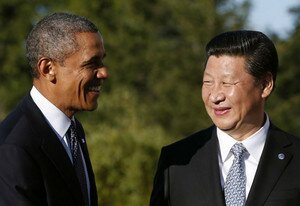 Actually, the new model of global lifestyle without Russia was determined in June 2013 at the meeting in Washington of US President Barack Obama and President of the PRC Xi Jinping. They abandoned the confrontation between their countries and agreed to intensify and broaden the dialogue at all levels. Later, these decisions were specified during regular meetings of senior officials from both countries, including during Obama's visit to China in November as part of his participation in the APEC summit.
Actually, the new model of global lifestyle without Russia was determined in June 2013 at the meeting in Washington of US President Barack Obama and President of the PRC Xi Jinping. They abandoned the confrontation between their countries and agreed to intensify and broaden the dialogue at all levels. Later, these decisions were specified during regular meetings of senior officials from both countries, including during Obama's visit to China in November as part of his participation in the APEC summit.
Quite telling are volumes of cooperation between China, the USA and the EU in trade-economic and investment sectors which are more than twenty times higher than those of cooperation between the PRC and Russia.
Creation of the SCO has not met Russia's expectations either. Instead of “anti-NATO” as planned by the Russian Federation, today the Shanghai Cooperation Organization has become an effective tool for China to strengthen Chinese presence in Central Asia, which Moscow considers “its exclusive sphere of influence”. Thus, China's investment, energy and transport projects in all five countries of the region have led to undermining of the economic and political basis of the Russian Federation's regional initiatives.
In particular this applies to Kazakhstan, which, as a member of the Customs Union and the upcoming Eurasian Economic Union, has not worse, but even closer economic and trade ties with China. At this, the volumes of Chinese investments into Kazakhstan's economy have already on the order exceeded the volumes of the financial contribution of the Russian Federation. The situation is similar in China's relations with other countries of Central Asia and, in general, of the former Soviet Union.
In a word, China pushes Russia out from former Soviet territories and does this a lot more aggressively and more effectively than the USA and the European Union. Even Belarus — Russia's closest ally — is actively developing relations with China, viewing it as an alternative to the Russian Federation. The same PRC actually inhibits all integration initiatives of Moscow on the territory of the former Soviet Union, including on the creation of the Eurasian Union as the main geopolitical project of the Kremlin and V. Putin personally. At this, Chinese experts openly admit that this project does not meet China's interests.
By the way, Russia and China are direct competitors in the issue of new transport corridors from the Asia-Pacific region and Central Asia to Europe. In particular, this competition includes: on the one hand-Russia's plans for the development of the Trans-Siberian Railway and the Northern Sea Route, and on the other — China's measures to rebuild the so-called “New Silk Road”. In this regard, the annexation of the Crimea by Russia broke the Ukrainian-Chinese agreement on the construction by China of a deep-water port near Yevpatoria as part of its transcontinental project that in no way added to Beijing's sympathy for Moscow.
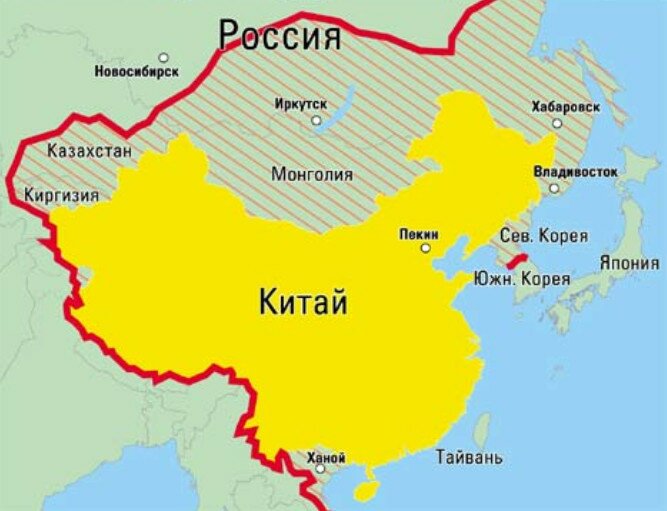 In the relationship between Russia and the PRC there are even more serious problems. Thus, despite China's having got into its disposal a number of islands in the Amur near Khabarovsk (2004), China has not given up territorial claims to the Russian Federation. Moreover, such claims relate not only to individual border areas, but also to the whole of Eastern Siberia and the Russian Far East, where great natural resources are concentrated.
In the relationship between Russia and the PRC there are even more serious problems. Thus, despite China's having got into its disposal a number of islands in the Amur near Khabarovsk (2004), China has not given up territorial claims to the Russian Federation. Moreover, such claims relate not only to individual border areas, but also to the whole of Eastern Siberia and the Russian Far East, where great natural resources are concentrated.
China has been actively implementing plans for “development” of Russian territories by uncontrolled populating the territory with its citizens. This issue is becoming critical for Russia in the situation of sharp disproportion of demographic potentials of Russia and China in favor of the Chinese side, especially in the eastern regions of the Russian Federation. For example, while the Eastern Siberia and Russian Far East are home to no more than 5-7 million people, in neighboring provinces in China there live more than 100 million.
Moscow is concerned about this fact and trying to strengthen the group of Russian troops in the east of the country, as well as to increase the scale of military maneuvers and trainings. For example, in September took place strategic command and staff trainings “Vostok-2014”, in which participated 155 thousand military servicemen, 8 thousand pieces of equipment, more than 630 aircrafts and 80 warships, as well as strategic aviation aircrafts Тu-95МS and new tactical missile systems “Iskander”.
On such steps of the Russian Federation, the Chinese leadership, for its part, responded with increased military activity in the Russian direction. In particular, in September-October this year were held large-scale operational and combat trainings of the People's Liberation Army (PLA) in Shenyang (border with Russia) Military Region. Besides, plans are being considered for relocation of some units of the PLA to the China-Russia border. On this basis, is being consistently reduced the extent of military cooperation between Russia and China both bilaterally and within the framework of the SCO.
The People's Liberation Army (PLA) holds intensive military exercises
The reason for this state of affairs is pragmatism of China, professing its own interests and not going to betray them for the sake of the Russian Federation and its anti-Western hysteria. Thus, in contrast to Russia, China has no real contradictions with the United States, NATO and the EU, with the exception of certain issues, which, as a rule, are solved within the framework of a constructive dialogue between the parties. Similarly, Western countries and international organizations see China, which in any case is not considered as a threat to their security, but sooner is a factor of deterring the expansionist policy of the Russian Federation.
As for Russia, it is China's supplier of natural resources, market for Chinese consumer products, as well as object of demographic expansion, which may soon turn into the Chinese annexation of Russian territories. Reason for this is given by Moscow's military aggression against Ukraine. This aggression, on the one hand, significantly weakens Russia because of the Western sanctions, and on the other — it demonstrates to China how, if necessary, to act.
All this determines China's policy towards the Russian Federation, including in the negotiations on energy issues. Thus, China avoids “strategic” relations with Russia and lending of its economy, well aware that the political and economic situation in Russia is rapidly deteriorating dramatically and this will soon give China a free access to Russian natural resources. And for China this is much more profitable than cash expenditures in support of Moscow's ambitions. And so it is quite obvious that China is involved in the USA and EU's campaign for the collapse of the Russian economy, hoping to participate in the division of Russia soon.

